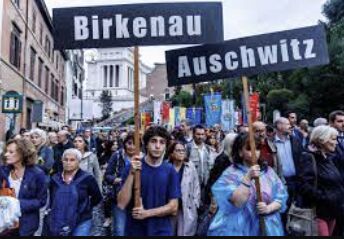Italy Breaks Silence: Holocaust Museum Project Finally Greenlit after 20-Year Delay
Italian lawmakers have approved the construction of a Holocaust Museum in Rome, with funding of 10 million euros. The project aims to confront Italy's role in the Holocaust and combat denial.
Italian lawmakers have unanimously voted in favor of a long-awaited project to build a Holocaust Museum in Rome. The urgency for the museum has been heightened by the recent killing of Israeli civilians by Hamas fighters, which has been deemed the deadliest attacks on Jews since the Holocaust. The measure includes 10 million euros in funding over three years for the construction of the exhibits, as well as 50,000 euros in annual operational funding.
The project, which was first conceived nearly 20 years ago, has faced numerous obstacles and bureaucratic hurdles, as well as a reluctance to examine Italy's fascist regime's role as a perpetrator of the Holocaust. However, Premier Giorgia Meloni's far-right-led government revived the project last spring. The president of the foundation overseeing the project, Mario Venezia, has emphasized the importance of highlighting Italy's role in the Holocaust, including the fascist regime's racial laws that excluded Jews from public life.
The racial laws of 1938 are considered crucial in laying the groundwork for the Nazi Holocaust, during which 6 million Jews were murdered. According to the Yad Vashem Museum in Jerusalem, out of Italy's 44,500 Jews, 7,680 were killed in the Holocaust. Many were rounded up by the German SS with the help of Italy's fascist regime and even ordinary Italians. Lawmaker Paolo Formentini from the right-wing League party recalled the execution of an Israeli Holocaust survivor during the recent attacks in Israel, stating, "We thought that events of this kind were only a tragic memory. Instead, it is an ancient problem that is reappearing like a nightmare."
The establishment of the Holocaust Museum in Rome is seen as crucial in combating denial and preserving the memory of World War II. Democratic Party lawmaker Nicola Zingaretti, whose Jewish mother escaped the 1943 roundup of Roman Jews, emphasized the need for the museum to serve as an authoritative protector of memory. While the site for the museum is yet to be finalized, part of Villa Torlonia, the former residence of Italy's fascist dictator Benito Mussolini, has been identified as a potential location. The unanimous vote by Italian lawmakers reaffirms the nation's commitment to confronting its dark past and ensuring the Holocaust is never forgotten.




